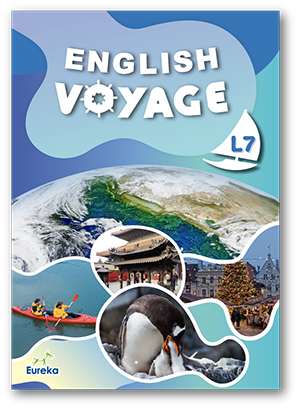All | Kindergarten Programmes | Primary School Programmes | Secondary School Programmes

Course Name: English Voyage Level 7
Level: Secondary 1
No. of Lessons: 10 (Suggested)
Lesson Duration: 80 mins (Suggested)
Instructors: Native English teachers with a university degree ; related teaching experience, and/or teacher training such as TEFL, TESOL, CELTA, PGDE/PCEd, etc.
Leaflet: Click here*
*Contact us via email at [email protected] or WhatsApp at 9846 7453 to obtain the password for the leaflet. Include your name, organization, and contact number in the message.
Objectives
- To introduce a range of useful, transferable vocabulary and phrases
- To introduce new grammar and sentence structures
- To allow students to practise using target language in relevant contexts and real-life interactions
- To build students’ confidence in speaking English in a safe and encouraging space
- To give students a valuable, enjoyable experience learning English
Features
In this English Voyage course, students are taught through a ‘spiral approach’. The flow of each lesson includes sequencing reception and production activities, both of which gradually prepare students for more complex, open-ended speaking tasks.
Students are encouraged to apply the linguistic skills learned in lessons to real-life conversations and situations; the speaking tasks give them plenty of opportunity to practise this, as well as getting used to applying the most appropriate words and phrases in different contexts. The sample dialogues are designed to mirror the language used by native English speakers in everyday interactions. Other spoken activities include paired and group discussions and presentations, to give students the chance to communicate spontaneously and express themselves in English. Our creative activities allow students to thrive and challenge themselves in a comfortable environment, where they can simply enjoy learning in the classroom.
The topics are interesting, engaging and well-suited to upper primary students. Students are invited to tap into their real-world knowledge and experience, meaning they also benefit from the student-centred learning aspect of this course.
Outline
Unit 1: Food: My Favourite Cha Chaan Teng (local Hong Kong diner)
-
- Sample dialogue: Make requests at a cha chaan teng
- Role-play: Help English-speaking friends to order
- Group discussion: Propose food to teachers
- Presentation: Propose new dishes for a cookery course
- Language focus:
– Vocabulary: Ordering at a restaurant
– Grammar: Constructing questions
Unit 2: Festivals: Great Times of the Year Around the World
-
- Sample dialogue: Travel agency recommendations
- Role-play: Express festival preferences
- Group discussion: Choose a destination
- Presentation: Create a blog post
- Language focus:
– Vocabulary: Festivals and preferences
– Structure: Writing skills
Unit 3: Save Our Planet: New Habits for a Better Environment
-
- Sample dialogue: Exchange opinions
- Role-play: Choose an environmental project
- Group discussion: Encourage students to take part
- Presentation: Prepare an advertisement or a short podcast
- Language focus:
– Vocabulary: The environment
– Grammar: Modal verbs and imperatives
Unit 4: Nature (Animals): Big and Small, Near and Far
-
- Sample dialogue: Guided tour at the zoo
- Role-play: Raise questions at a walking tour
- Group discussion: interesting facts and information
- Presentation: Prepare an educational talk
- Language focus:
– Vocabulary and compound words: Animals
– Grammar: Sentence structure to denote properties
Unit 5: Films: Watch and Talk
-
- Sample dialogue: Dialogue between cast and crew members
- Role-play: Pre-production meeting
- Video: Teenage issues
- Presentation: Propose a short film for the film club
- Language focus:
– Vocabulary: Films
– Grammar: Sentence patterns for giving evaluations
Unit 6: Performances: A Simple Magic Trick
-
- Warm-up: Demo of the coin-through-the-elbow trick
- Video: Magic trick tutorial
- Transcript: Useful phrases
- Activity: Try doing the magic trick
- Language focus:
– Vocabulary: Giving instructions
– Grammar: Sentence patterns for giving instructions
Unit 7: Technology: Options for Socialising
-
- Sample dialogue: Making friends
- Role-play: Asking friends for help and having fun together
- Group discussion: Online and face-to-face activities
- Presentation: How to sustain friendships
- Language focus:
– Vocabulary: Activities and relationships
– Skills: Expressions for informal conversation
Unit 8: Leisure: Recreation Outside the Home
-
- Sample dialogue: Leisure activities
- Role-play: Council meeting
- Group discussion: Recommend inexpensive activities
- Presentation: Encourage teenagers to explore outdoor activities
- Language focus:
– Vocabulary: Outdoor activities
– Skills: Expressions for making recommendations
Unit 9: Well-being: Happiness and Health
-
- Sample dialogue: Personal growth
- Group discussion:
– Journaling techniques
– Choose techniques to help other teenagers - Presentation: Helping others to cope with challenges
- Language focus:
– Vocabulary: Events and ideas
– Skills: Expressions for making recommendations
Unit 10: Imaging My Future: 10 years from now
-
- Warm-up: Media interview
- Group discussion:
– Sharing thoughts on qualities of life
– What life do you hope to lead 10 years from now? - Short narrative: Describe a typical day 10 years from now
- Language focus:
– Vocabulary: Lifestyle and ambitions
– Grammar: Modals and future verb ‘tenses’
